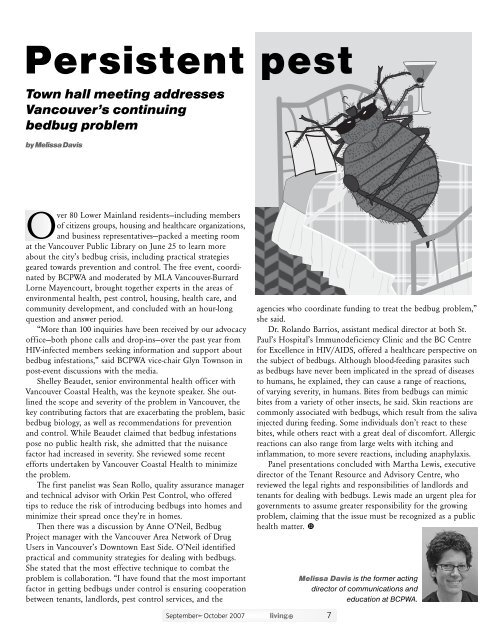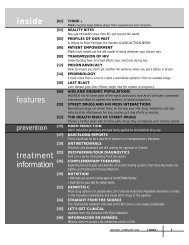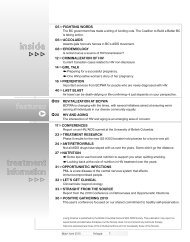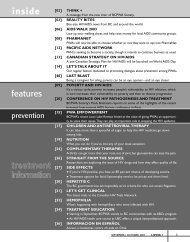iv poz mag.qxd - Positive Living BC
iv poz mag.qxd - Positive Living BC
iv poz mag.qxd - Positive Living BC
You also want an ePaper? Increase the reach of your titles
YUMPU automatically turns print PDFs into web optimized ePapers that Google loves.
issue 50.<strong>qxd</strong>:l<strong>iv</strong> <strong>poz</strong> <strong>mag</strong>.<strong>qxd</strong> 9/3/07 4:04 PM Page 7<br />
Pe r s i stent p e st<br />
Town hall meeting addresses<br />
Vancouver’s continuing<br />
bedbug problem<br />
by Melissa Davis<br />
Over 80 Lower Mainland residents—including members<br />
of citizens groups, housing and healthcare organizations,<br />
and business representat<strong>iv</strong>es—packed a meeting room<br />
at the Vancouver Public Library on June 25 to learn more<br />
about the city’s bedbug crisis, including practical strategies<br />
geared towards prevention and control. The free event, coordinated<br />
by <strong>BC</strong>PWA and moderated by MLA Vancouver-Burrard<br />
Lorne Mayencourt, brought together experts in the areas of<br />
environmental health, pest control, housing, health care, and<br />
community development, and concluded with an hour-long<br />
question and answer period.<br />
“More than 100 inquiries have been rece<strong>iv</strong>ed by our advocacy<br />
office—both phone calls and drop-ins—over the past year from<br />
HIV-infected members seeking information and support about<br />
bedbug infestations,” said <strong>BC</strong>PWA vice-chair Glyn Townson in<br />
post-event discussions with the media.<br />
Shelley Beaudet, senior environmental health officer with<br />
Vancouver Coastal Health, was the keynote speaker. She outlined<br />
the scope and severity of the problem in Vancouver, the<br />
key contributing factors that are exacerbating the problem, basic<br />
bedbug biology, as well as recommendations for prevention<br />
and control. While Beaudet claimed that bedbug infestations<br />
pose no public health risk, she admitted that the nuisance<br />
factor had increased in severity. She reviewed some recent<br />
efforts undertaken by Vancouver Coastal Health to minimize<br />
the problem.<br />
The first panelist was Sean Rollo, quality assurance manager<br />
and technical advisor with Orkin Pest Control, who offered<br />
tips to reduce the risk of introducing bedbugs into homes and<br />
minimize their spread once they’re in homes.<br />
Then there was a discussion by Anne O’Neil, Bedbug<br />
Project manager with the Vancouver Area Network of Drug<br />
Users in Vancouver’s Downtown East Side. O’Neil identified<br />
practical and community strategies for dealing with bedbugs.<br />
She stated that the most effect<strong>iv</strong>e technique to combat the<br />
problem is collaboration. “I have found that the most important<br />
factor in getting bedbugs under control is ensuring cooperation<br />
between tenants, landlords, pest control services, and the<br />
agencies who coordinate funding to treat the bedbug problem,”<br />
she said.<br />
Dr. Rolando Barrios, assistant medical director at both St.<br />
Paul’s Hospital’s Immunodeficiency Clinic and the <strong>BC</strong> Centre<br />
for Excellence in HIV/AIDS, offered a healthcare perspect<strong>iv</strong>e on<br />
the subject of bedbugs. Although blood-feeding parasites such<br />
as bedbugs have never been implicated in the spread of diseases<br />
to humans, he explained, they can cause a range of reactions,<br />
of varying severity, in humans. Bites from bedbugs can mimic<br />
bites from a variety of other insects, he said. Skin reactions are<br />
commonly associated with bedbugs, which result from the sal<strong>iv</strong>a<br />
injected during feeding. Some ind<strong>iv</strong>iduals don’t react to these<br />
bites, while others react with a great deal of discomfort. Allergic<br />
reactions can also range from large welts with itching and<br />
inflammation, to more severe reactions, including anaphylaxis.<br />
Panel presentations concluded with Martha Lewis, execut<strong>iv</strong>e<br />
director of the Tenant Resource and Advisory Centre, who<br />
reviewed the legal rights and responsibilities of landlords and<br />
tenants for dealing with bedbugs. Lewis made an urgent plea for<br />
governments to assume greater responsibility for the growing<br />
problem, claiming that the issue must be recognized as a public<br />
health matter. 5<br />
Melissa Davis is the former acting<br />
director of communications and<br />
education at <strong>BC</strong>PWA.<br />
SeptemberqOctober 2007 l<strong>iv</strong>ing5 7











